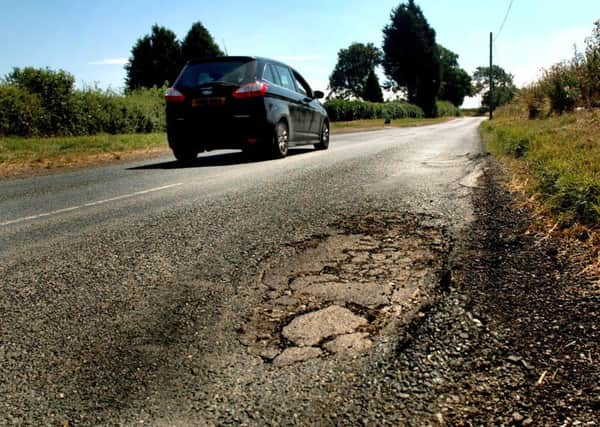Speed at repairing potholes in Melton area is second slowest in UK


According to the RAC foundation the county council takes three days to repair a road with an urgent problem – the second longest response time in the country.
A handful of authorities make the repairs within 30 minutes but the most common response time is two hours.
Advertisement
Hide AdAdvertisement
Hide AdA spokesperson for Leicestershire County Council said: “We’re aware of the RAC report, but it’s really important to make it clear that if we are made aware of an emergency repair, we aim to be on site within two hours to make the road safe until a more permanent fixing of the pothole can be arranged.
“When it comes to these permanent fixes on the worst potholes, we carry out the majority of the work within 72 hours and our current performance levels are well within that.
“Some authorities listed as having quicker response times may only be doing patch-up jobs.
“We work very hard to tackle potholes across the county with additional resources deployed, when possible, to help with the increase in demand. Last year we repaired 7,650 potholes.”
Advertisement
Hide AdAdvertisement
Hide AdThe spokesperson added: “While our roads are currently among the best in the country, we have much less money to look after them.
“That’s why we’re developing a new risk-based approach which allows the limited resources we have to be focussed on potholes which are likely to cause problems, while also carrying out lower risk repairs in the most cost effective way.”
The county council says that a hole in the road has to be at least 40mm deep before they will assess it and provide an estimated response time.
In November the council moved to a risk-based approach of fixing potholes, meaning that not only will the size of a pothole be taken into account but also the type of road it is on, the volume of traffic that road carries and the mix of road users.
Advertisement
Hide AdAdvertisement
Hide AdThe figures provided to the RAC foundation found that 190 of the 207 local highway authorities in Britain – 75 per cent – had already moved to a risk-based approach by Autumn 2018.
Steve Gooding, director of the RAC Foundation, said: “It is good to see that the vast majority of local highway authorities are adopting the best practice ‘risk-based’ approach, which is putting the risk to road users front and centre alongside the potential for a defect to develop into a bigger structural problem.
“The total number of potholes being filled in might still be limited by a shortage of funding, but this approach at least means those that are most dangerous are fixed first.
“It is understandable that large rural authorities set themselves longer response times, simply as a result of having to travel further to effect repairs, but motorists might still be surprised to see such a wide variation across the country.
Advertisement
Hide AdAdvertisement
Hide Ad“Those particularly vulnerable to potholes – cyclists and motorcyclists – might ask whether the speed of pothole investigation should be based solely on the risk to users.”
Jennifer Thomas, from The Federation of Small Business said: “It’s easy to dismiss potholes as an irrelevance, but pot holes are one of our members’ biggest gripes across the UK.
Poorly maintained roads peppered with holes and cracks not only hamper small firms’ ability to do business, but risk damage to vehicles, which are vital assets to businesses often working without large capital reserves.
“Small businesses need free flowing, well-maintained road networks to compete and grow, but these figures suggest it’s still something of a postcode lottery.”